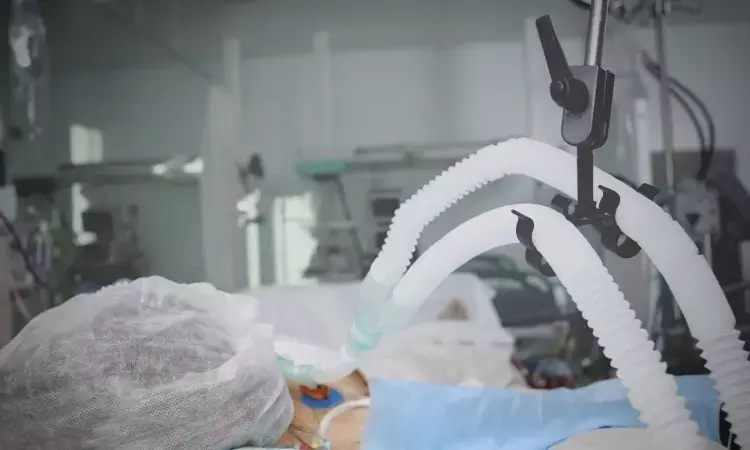- Home
- Medical news & Guidelines
- Anesthesiology
- Cardiology and CTVS
- Critical Care
- Dentistry
- Dermatology
- Diabetes and Endocrinology
- ENT
- Gastroenterology
- Medicine
- Nephrology
- Neurology
- Obstretics-Gynaecology
- Oncology
- Ophthalmology
- Orthopaedics
- Pediatrics-Neonatology
- Psychiatry
- Pulmonology
- Radiology
- Surgery
- Urology
- Laboratory Medicine
- Diet
- Nursing
- Paramedical
- Physiotherapy
- Health news
- Fact Check
- Bone Health Fact Check
- Brain Health Fact Check
- Cancer Related Fact Check
- Child Care Fact Check
- Dental and oral health fact check
- Diabetes and metabolic health fact check
- Diet and Nutrition Fact Check
- Eye and ENT Care Fact Check
- Fitness fact check
- Gut health fact check
- Heart health fact check
- Kidney health fact check
- Medical education fact check
- Men's health fact check
- Respiratory fact check
- Skin and hair care fact check
- Vaccine and Immunization fact check
- Women's health fact check
- AYUSH
- State News
- Andaman and Nicobar Islands
- Andhra Pradesh
- Arunachal Pradesh
- Assam
- Bihar
- Chandigarh
- Chattisgarh
- Dadra and Nagar Haveli
- Daman and Diu
- Delhi
- Goa
- Gujarat
- Haryana
- Himachal Pradesh
- Jammu & Kashmir
- Jharkhand
- Karnataka
- Kerala
- Ladakh
- Lakshadweep
- Madhya Pradesh
- Maharashtra
- Manipur
- Meghalaya
- Mizoram
- Nagaland
- Odisha
- Puducherry
- Punjab
- Rajasthan
- Sikkim
- Tamil Nadu
- Telangana
- Tripura
- Uttar Pradesh
- Uttrakhand
- West Bengal
- Medical Education
- Industry
Inhaled Amikacin May Reduce Ventilator-Associated Pneumonia Risk

A recent multicenter, double-blind, randomised controlled trial suggests that a 3-day course of inhaled amikacin, administered to critically ill patients who have undergone mechanical ventilation for at least 3 days, may significantly reduce the risk of ventilator-associated pneumonia (VAP).
This study was published in The New England Journal Of Medicine by Stephan Ehrmann and colleagues. The study included 847 critically ill adults. Patients in the amikacin group received a daily dose of 20 mg per kilogram of ideal body weight. Inhaled amikacin or placebo was administered for 3 days. The majority of patients in both groups received all three daily nebulizations, ensuring proper adherence to the treatment protocol.
Ventilator-associated pneumonia (VAP) is a common and serious complication in critically ill patients on mechanical ventilation, but preventive measures have been unclear until now. The study, which included 847 patients, found the following key results:
- Reduced Incidence of VAP: Inhaled amikacin administration for 3 days led to a significant reduction in the incidence of VAP. At 28 days, VAP occurred in 15% of the amikacin group compared to 22% in the placebo group.
- Improved Survival Time: The use of inhaled amikacin increased the restricted mean survival time without VAP by 1.5 days during the 28-day follow-up period.
- Fewer Complications: Patients receiving inhaled amikacin experienced fewer infection-related ventilator-associated complications, with a hazard ratio of 0.66, indicating a 34% reduced risk.
- Safety Profile: The study reported a low rate of serious adverse effects related to the treatment, making inhaled amikacin a well-tolerated intervention.
These findings are promising for reducing the burden of VAP, improving outcomes in critically ill patients undergoing mechanical ventilation.This study provides evidence of an effective preventive measure for VAP in mechanically ventilated patients. Reduced rates of VAP can lead to shorter hospital stays, lower healthcare costs, and improved patient outcomes. Clinicians and healthcare providers should consider the potential benefits of inhaled amikacin in reducing VAP incidence in their critically ill patients.
Reference:
Ehrmann, S., Barbier, F., Demiselle, J., Quenot, J.-P., Herbrecht, J.-E., Roux, D., Lacherade, J.-C., Landais, M., Seguin, P., Schnell, D., Veinstein, A., Gouin, P., Lasocki, S., Lu, Q., Beduneau, G., Ferrandiere, M., Plantefève, G., Dahyot-Fizelier, C., Chebib, N., … Tavernier, E. Inhaled amikacin to prevent ventilator-associated pneumonia. The New England Journal of Medicine,2023. https://doi.org/10.1056/nejmoa2310307
Dr Riya Dave has completed dentistry from Gujarat University in 2022. She is a dentist and accomplished medical and scientific writer known for her commitment to bridging the gap between clinical expertise and accessible healthcare information. She has been actively involved in writing blogs related to health and wellness.
Dr Kamal Kant Kohli-MBBS, DTCD- a chest specialist with more than 30 years of practice and a flair for writing clinical articles, Dr Kamal Kant Kohli joined Medical Dialogues as a Chief Editor of Medical News. Besides writing articles, as an editor, he proofreads and verifies all the medical content published on Medical Dialogues including those coming from journals, studies,medical conferences,guidelines etc. Email: drkohli@medicaldialogues.in. Contact no. 011-43720751


